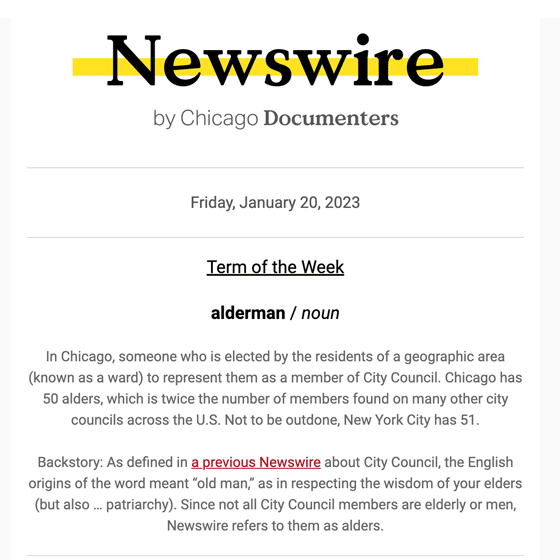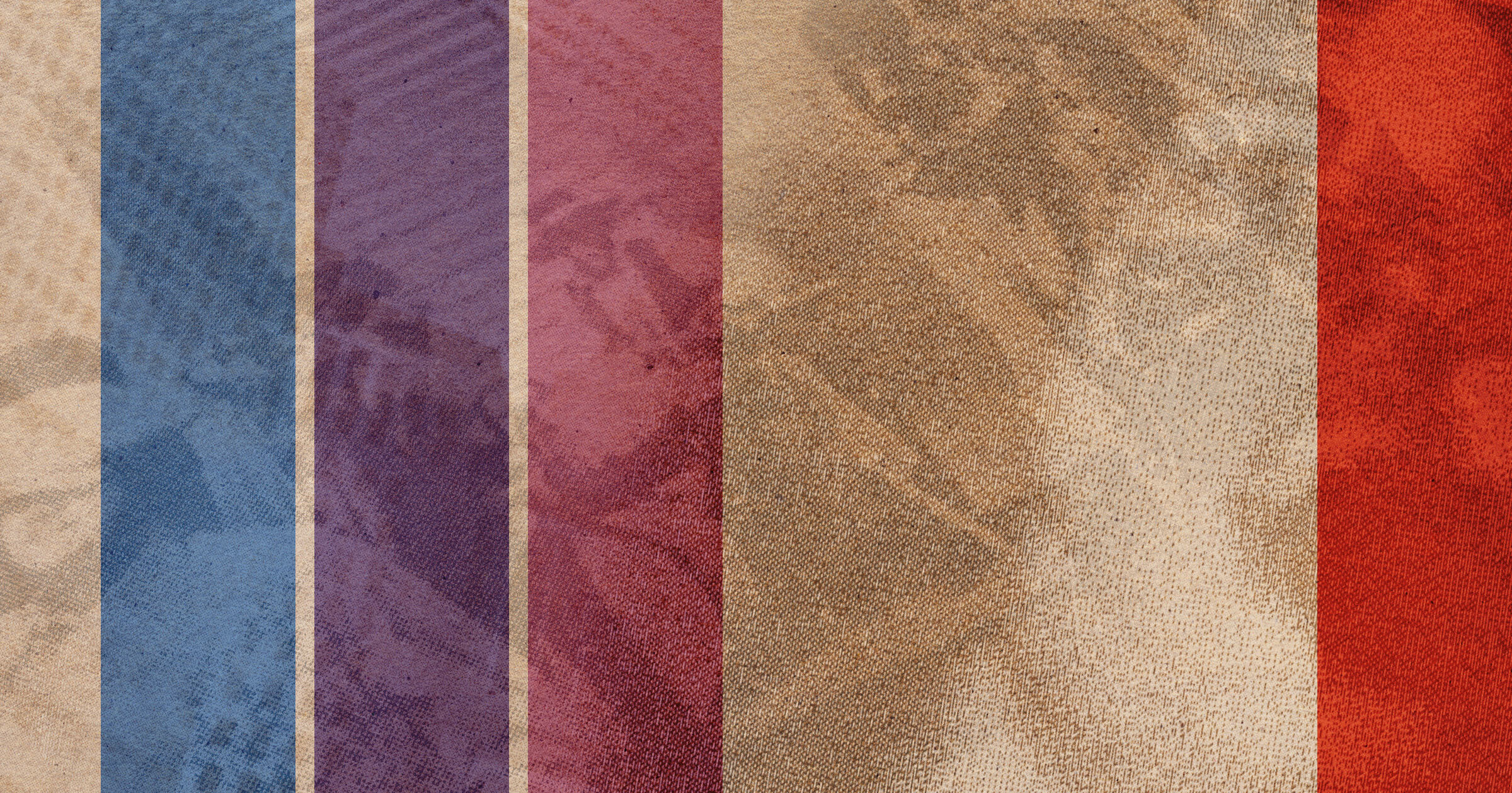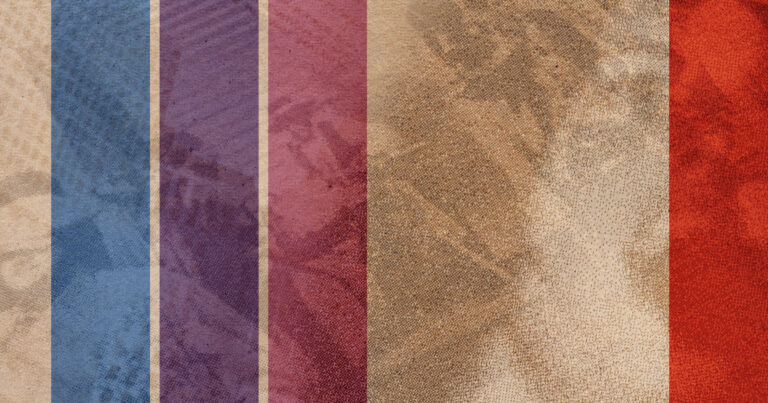Q & A: India Daniels, Newswire by City Bureau
Newswire from City Bureau is one of my favorite newsletters. In a recent Newsletter Spotlight, I highlighted how Newswire’s redesign showcased a change in strategy rather than a visual redesign with some new fonts but the same content.
I wanted to learn more, so I spoke with India Daniels, who writes Newswire. During our conversation, India shared how she approached the redesign, striking a balance to help audiences understand local government and finding humor in dry topics.
Disclosure: I have been a City Bureau donor for several years.

Meet India Daniels
India has a background in curriculum design, copy editing, and nonprofit coordination.
She writes about civic power via the Newswire, a twice-weekly email newsletter based on Chicago Documenters’ questions and insights from local government meetings.
Photo by Zakkiyyah Najeebah
Cory Brown: I saw your bio on the City Bureau website. Do you have a background in curriculum design? Can you tell me about that?
India Daniels: I started working for City Bureau about a year and a half after I graduated college. The year before I was in Americorps VISTA at a parent engagement and student literacy nonprofit. I designed and ran monthly student workshops at schools in North Lawndale [Chicago]. When I initially came to City Bureau, I coordinated the Chicago Documenters program, so I was the main point of contact for the people we were training and paying to take notes on and live-tweet local government meetings. Over the past few years, I’ve edited assignments, run trainings, coached Documenters, and now I’m writing the Newswire, which is a twice-a-week newsletter designed around Documenters’ content.
How long have you been writing? Do you write just the Newswire?
I’ve always been interested in writing and research but didn’t really think of myself as a journalist until I started writing the Newswire. Down the line, we’re hoping to create space for other writers in the Newswire and time for me to do longer-form reporting.
How long have you been working on Newswire?
In the winter of 2020, we worked with Olivia Stovicek, a former City Bureau fellow and Documenter, to pilot the Newswire, and then I took over as the newsletter producer when we launched it in the spring of 2021. I had spent the past three years being the main person reviewing all the notes and tweets from Documenters, covering about ten public meetings a week. That is how I can talk about the city and how things work because I read everything Documenters sent in for three years. It was an exciting/natural progression for me to be able to take this experience, build on the vast knowledge base that Documenters create, and share it in a more accessible way.
The Newswire redesign wasn’t a visual redesign as much as here’s how we’re approaching the content redesign. What prompted the redesign in general? Can you kind of talk about that process a little bit?
When we first launched Newswire, it was every weekday. It was very focused on what happened at a particular meeting. We would sometimes provide deeper context on an issue in a particular meeting, but it was pretty hard to do that.
When we started the Newswire, it attracted civic nerds and other wonky readers who already had a certain base level of understanding of the ins and outs of local government. There are so many layers of subtext and context as to why things are happening a particular way at public meetings, which is hard to grasp from piecemeal summaries.
In the redesign of the newsletter, we wanted to provide some introductory civics education, so that anyone picking up the Newswire could learn about the dynamics of local government, and have a baseline understanding of the context necessary to follow the public meeting updates that they might be interested in. That was the main reason why we decided to turn the Friday issue into a longer series that takes a look at more basic elements of local government, which is one of the most significant changes you can see in the new design.

Newsletter Spotlight: Newswire by Chicago Documenters from City Bureau
What really struck me about this approach is that it’s fun, and it’s making useful information interesting. How did you decide on the city budget first? Was that just a factor of scheduling or did you think this is a good, hearty topic to take on first?
Kind of both. It was a factor of scheduling because we relaunched at the beginning of August 2022. I don’t even know that we debated it. Each fall, alders spend about six weeks hashing out the upcoming year’s budget. Those hearings reveal a lot about who holds power in government and what they are willing to invest in, but they are also an opportunity for communities to push the needle and challenge policies that haven’t served them well. We were just like, yes, we have to write about the budget and explain it alongside the Documenters coverage that is coming in.
Did you come up with the tactic of treating Newswire like a soap opera or telenovela?
Yeah, that came to me in a random moment because I was in the weeds thinking, “this is complicated, and people don’t like this.” When I looked at Mailchimp data from past Newswire issues, I noticed that many of the issues with the lowest open rates had the word “budget” in the subject line. I didn’t control for time of day or anything like that, but it did get me thinking about how to talk about the city budget without using that word. The telenovela theme was a way to make it more fun. I’ve always enjoyed having some sort of theme or motif in my writing.
I’ve also noticed a sense of humor running through Newswire. In the November 11 Newswire, there was a line about how the city has a history of “elaborate schemes to avoid the consequences of its actions, (reversing the flow of the Chicago River to send polluted water south).” That’s funny! I like that because the subject matter can be very dry.
How much of it is your voice versus a voice that you’re crafting specifically for Newswire so that it has a voice?
Voice is something that we talk about a lot. Early on, I wrote the Newswire in a very dry, matter-of-fact way. And I think you have to do that first and figure out the core pieces of content in order to develop more of a voice and a sense of humor as you go. The telenovela theme did help me capture that a little bit more, but it still feels like something that I’m figuring out.
What Documenters know and enjoy is that once you start paying attention, there are so many interesting and funny things in these mundane meetings. I’m trying to bring that through to the average reader who maybe isn’t in it enough to get all the silly aspects of it. As far as how much it is like my personal voice, I think I have a bit of a dry, understated sense of humor. Newswire is more overt.
What kind of process did you undertake to make the redesign happen?
We took a month or two off and did a reader survey. I looked at MailChimp data. Bettina Chang [City Bureau co-founder and co-executive director of Chicago program], Nalani Saito [former Chicago Documenters program manager]. and I had several brainstorming meetings where we talked about the different parts of the Newswire, what we were trying to accomplish, and how people interact with email newsletters. One turning point conversation was when we decided to use Friday issues to expand more on a particular topic and include links to other news articles to balance out. Tuesday’s Newswire is giving a recap of the previous week’s meetings and ways to get involved.
Not having a daily newsletter is freeing in a lot of ways. I’ve really liked that the Tuesday issue allows us to come back to something that might have been on people’s radar last week, to say, “Hey, this is still a thing! It happened, but you can keep thinking about it and it’s going to come back.”
Were there any outside inspirations that influenced the changes besides telenovelas?
During a 2021 Gather Lightning Chat [registration required], Becca Aronson said to us the number one mistake that newsletter writers make is trying to do both voice and newsiness, and that you should really pick and commit to one. I see that in some cases, but then in other cases, this mix of things is working. That’s something that I’ve kept in the back of my mind. How much of this is voice and how much of this is about news? And I think the Tuesday and Friday issues allow us to do both.
I read other local newsletters like Chicago Public Square, Hey Chicago by City Cast and WBEZ’s the Rundown, but the Newswire has always felt pretty different. The closest thing to what we do is The Daily Line. They have two or three reporters covering all the city hall meetings and writing to an audience of businesspeople, realtors, and other influential people in politics. They can be very detailed and assume that their readers have a certain level of understanding, whereas the Newswire is more interested in how readers can build up their understanding but also make it their own.
How do you define success for Newswire?
We want to see people taking action or getting involved in their communities. With the initial Newswire, the calls to action were more explicit. There would be a blurb from a meeting and then, “here’s what you can do” or “how you can get involved.” We don’t do that as much in the current form, which is something that is in the back of my mind. Maybe we do want to bring that part back. We have the “get involved” section on Tuesdays, but it’s a little bit divorced from the rest of the newsletter. In the current form, the goal is to expand the ways that people think about civic power and provide the information necessary for people to get involved in their own way.
I’m so glad you didn’t say open rates.
I mean, open rates are important. We have not really done nearly as much promotion as maybe we ought to have, but it’s been nice to not have that be the focus at this point.
Do you have any advice for newsletter producers that are taking on a new project or a redesign?
A content redesign is great, but it’s also important to take stock after you actually launch the new format. You can get really theoretical and have ideas about what’s going to work. When actually implementing it, you see pain points and other issues that you didn’t anticipate. It’s valuable to make time to think about: Is this doing what we initially set out to do? Are there things that aren’t working? Are there other things that we took out that it would maybe be good to put back in?
Do you have any newsletters you think more people should be reading?
Are you familiar with Illinois Answers Project? Alex Nitkin, who used to be at The Daily Line is now writing for them, and he has a newsletter called Point of Information. I think similarly, he is in a place where he’s figuring out what sticks. He’s also doing the explainer thing but at a more complex level.
What’s been your most meaningful moment working at City Bureau?
I really love working with Documenters. I learned everything I know about city government from reviewing their notes and tweets and tracking down information on the city websites. These are regular people who are trying to make sense of a very confusing city government that is not set up to be easily understood. They take notes and maybe they didn’t totally understand everything in it. But with me reviewing their submissions and them building on the notes that other Documenters took on that same agency, we’re creating this collective knowledge base. I love working with Documenters and hearing what makes them curious, what they want to learn more about, and seeing the different directions that they take. The Newswire is trying to bring that feeling of civic learning to a broader audience.
This post was edited for length and clarity.
Get more expert insights for building
strong relationships with your audience in the 99 Newsletter Project newsletter:
You can opt-out at any time.
For more details, please review the Terms of service and Privacy Notice.

